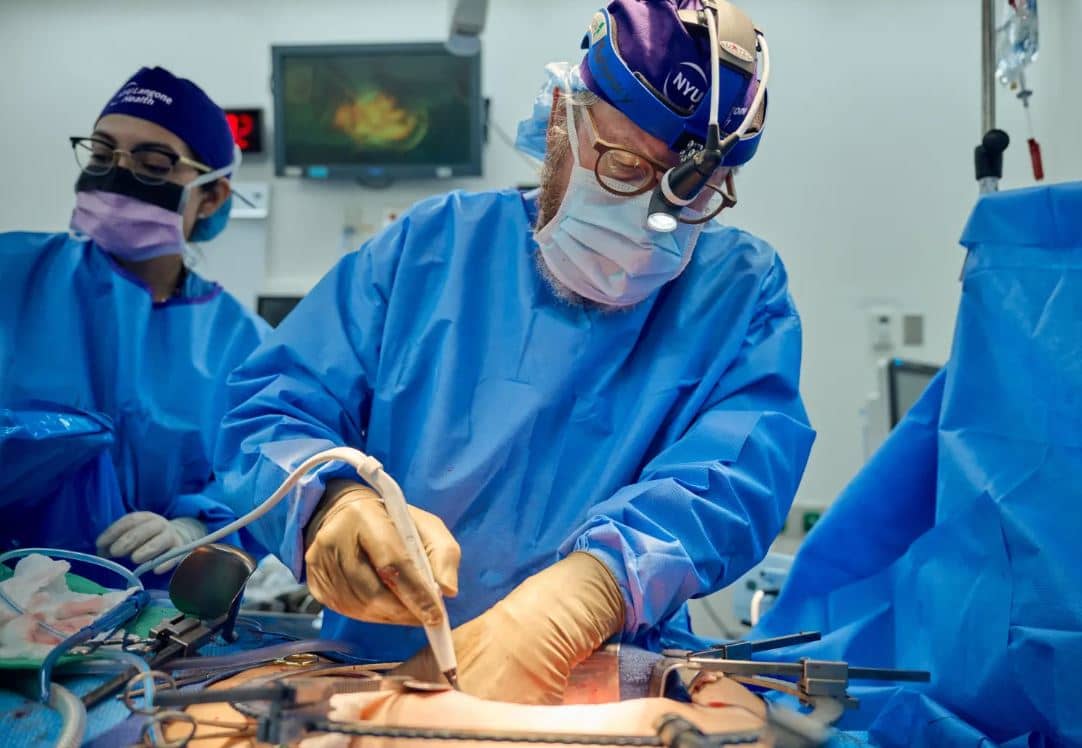
In a medical breakthrough, NYU Langone surgeons successfully transplanted a pig kidney into a brain-dead man who has now survived on the organ for over a month.
“This represents the longest period that a gene-edited pig kidney has functioned in a human, and the latest step toward the advent of an alternate, sustainable supply of organs for transplant,” according to an NYU Langone news release.
The surgical staff also gave a special thanks to Mary Miller Duffy, the sister of the brain-dead man, Maurice Miller, who allowed her brother’s body to be used for the innovative procedure.
“I want to begin by acknowledging how grateful we all are to Mary, who’s sitting next to me,” said Dr. Robert Montgomery at a news presentation attended by The Post.
“She, at a time of profound grief, found a way to help her brother to realize his desire to give a gift to humanity at the time of his death,” added Montgomery, lead surgeon and chair of the NYU Langone Department of Surgery.
Research on the first-of-its-kind operation, which took place July 14, will continue into mid-September, as doctors monitor how long the animal’s kidney will function properly inside a human body beyond 32 days.
The pig kidney had only “one genetic modification and [is] without experimental medications or devices,” according to Montgomery.
In xenotransplants, the medical term for a cross-species organ transplant, Montgomery and his team had to create a unique solution for the patient’s body to avoid “hyperacute rejection” of the animal’s organ once it connected to the 57-year-old man’s circulatory system.
This was done by “knocking out” the alpha-gal gene that doctors altered to prevent a rejection in the man.
Additionally, the pig’s thymus gland — which communicates with its immune system — “was embedded underneath the outer layer of the kidney to stave off novel, delayed immune responses.
“The combination of modifications has been shown to prevent rejection of the organ while preserving kidney function,” according to NYU.
This potentially game-changing surgery, part of a larger study on the subject, could someday prove an efficient treatment for the more than 103,000 people in need of organ transplants across the U.S.
“There are simply not enough organs available for everyone who needs one,” said Montgomery, who himself had a heart transplant five years ago.
“Too many people are dying because of the lack of available organs, and I strongly believe xenotransplantation is a viable way to change that.”
Montgomery’s latest success not only reduced the amount of genetic modifications needed from ten to one, but could lead to the surgery becoming a viable option for people in need during the years to come.
“We’ve now gathered more evidence to show that, at least in kidneys, just eliminating the gene that triggers a hyperacute rejection may be enough along with clinically approved immunosuppressive drugs to successfully manage the transplant in a human for optimal performance — potentially in the long-term,” Montgomery said.
“We think using a pig already deemed safe by the FDA, in combination with what we have found in our xenotransplantation research so far, gets us closer to the clinical trial phase,” Montgomery added.
“We know this has the potential to save thousands of lives, but we want to ensure the utmost safety and care as we move forward.”
CLICK HERE TO JOIN OUR WHATSAPP GROUP
CLICK HERE TO JOIN OUR WHATSAPP GROUP
CLICK HERE TO JOIN OUR WHATSAPP GROUP
CLICK HERE TO JOIN OUR WHATSAPP GROUP
Advertise with the mоѕt vіѕіtеd nеwѕ ѕіtе іn Antigua!
We offer fully customizable and flexible digital marketing packages.
Contact us at [email protected]
















